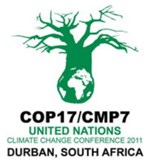
"We are responsible for 38% of Africa's total emissions. The National Climate Change Response (CCR) White Paper states our commitment to reduce CO2 emissions by 34% below a business as usual trajectory in 2020 and by 40% in 2025 before stabilising our emissions in absolute terms, and ultimately reducing them," said Molewa.
Deforestation is another major challenge. The Food and Agriculture Organisation (FAO) places six out of the 10 largest forest losses in the world in sub-Saharan Africa. This is largely due to forest areas being converted for relatively low-income usage.
"A programme of incentives to avoid deforestation in Africa could make great inroads into mitigating CO2 emissions, at the same time supporting greener alternatives," said Molewa.
Although Africa has contributed the least to the build-up of greenhouse gases globally, it will be in the frontline of the adverse effects of climate change because the continent is already highly dependent on climate-sensitive sectors such as rain-fed agriculture.
It is said that the average African generates about 13 times less greenhouse gases than someone in North America does.
In the absence of overriding mitigation and adaptation agenda, this figure is set to rise in coming years, as development and population rates grow.
However, opportunities for economic development are vast and therefore Africa needs to embark on a path of sustainable development with new, clean, appropriate technologies and to build climate resilient communities, said Molewa.
There are around 550 million people in Africa that do not have access to electricity, putting the continent in a position to become a world leader in the deployment of renewable energy sources.
"Hydropower, for instance, is an underutilised energy source, with less than 10% of the hydropower potential in Africa being utilised currently. A national, regional and international effort towards unlocking this potential is an example of how African societies could go from being amongst the most vulnerable to becoming climate resilient," said Molewa.
The minister added that the African Union has partnered with South Africa to ensure that the African Pavilion at COP17 effectively presents the issues of climate change that Africa is grappling with, and the opportunities for green development that responds to climate change.
"Because of Africa's vulnerability to climate change, failure to contain average global temperature increases to within 2 degrees would be an unacceptable outcome for the global mitigation effort... The impacts of climate change know no borders, and have been a driving force for cooperation between African governments," said Molewa.
The Commission of the African Union has begun work on an African Strategy on Climate Change that is built on four interrelated themes, including climate change governance, mainstreaming climate change in development, harnessing education, science, research and innovation for climate change, and promoting regional and international cooperation and partnerships in climate.
SAnews.gov.za is a South African government news service, published by the Government Communication and Information System (GCIS). SAnews.gov.za (formerly BuaNews) was established to provide quick and easy access to articles and feature stories aimed at keeping the public informed about the implementation of government mandates.
Go to: http://www.sanews.gov.za